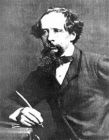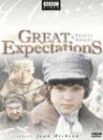远大前程 Great Expectations
查尔斯·狄更斯(Charles Dickens,1812--1870)是英国十九世纪伟大的批判现实主义作家,一生创作了大量作品,广泛描写了19世纪英国维多利亚时代的社会生活,揭露了资产阶级金钱世界的种种罪恶。狄更斯(1812-----1870)英国现实主义作家,是继莎士比亚之后对实界文学产生巨大影响的小说家。代表有《匹克威克外传》《双城记》等。狄更斯所生活的年代,英国资本主义经济发展迅速。经济繁荣的同时,现实的阶级矛盾也逐渐加深统治阶级疯狂追求利润,想发横财,工人们失业无家可归。狄更斯从人道主义出发,呼吁统治者在追求个人利益的同时,不能剥夺劳动人民的权力,劝戒统治者要讲道德,做有良知的人。
《远大前程》是他的主要作品之一。 孤儿皮普从小由姐姐抚养,受雇于贵族郝维辛,并且爱上了她的养女埃·斯黛拉,一心想成为“上等人”。他小时候好心搭救的一名逃犯在国外发财致富,为报答救命之恩,巧妙安排他去伦敦接受上等教育,进入上流社会。然而命运并不与皮普的希望接轨:埃·斯黛拉另嫁他人,逃犯被擒、遗产充公,皮普的“远大前程”转眼化为泡影。整部小说情节扣人心弦又感人至深,希望由萌生而至幻灭的过程唤起一代又一代读者的共鸣。不少西方评论家将其推崇为狄更斯最出色的作品。
第一部
父母双亡的小朋友皮普,从小由一个母老虎姐姐抚养,他和憨厚的铁匠姐夫乔经常受到老婆的殴打,有一天,皮普在父母的坟墓前遇到一个逃犯,那逃犯吓唬他威胁他,让皮普为他弄来食物和矬子(用来弄开枷锁),恐惧的皮普照做了,但不久,逃犯就在和另一个逃犯搏斗的过程中被警察逮捕了.不久,富有的老处女郝维辛小姐派人为她寻觅一个男孩,以伴老服务的名义,来实施她恶毒的爱情游戏的计划,皮普被选中了,每天忍受喜怒无常的骄傲的埃·斯黛拉的羞辱和老处女郝维辛小姐的嘲笑。为了维护被老处女和小处女伤害的自尊心,皮普暗地里决心学习识文断字,并希望有好的前途,并且希望最后能娶骄傲的埃·斯黛拉,他不但找了个叫毕蒂的女人,还找了村里的老修女。但他知道这样下去是无法超越埃·斯黛拉的,于是只好认命作了铁匠,然而突然有一天,郝维辛小姐的御用律师前来,说有个神秘人要把财产全部留给皮普,并带他去伦敦接受礼仪交际的教育,皮普很高兴自己终于能有好的前途了。
第二部
单纯无知的皮普慢慢习惯了伦敦的生活,和小时候打架的赫伯斯成了朋友和室友,从律师那里拿钱挥霍,结识了律师手下的一个官员,在一个郝维辛小姐的亲戚家接受教育,并加入了一个愚蠢的俱乐部,并且坚持每星期去看望他喜爱的埃·斯黛拉,并沉湎于她的美色和谎言,并妒嫉一个和埃·斯黛拉来往密切的猥琐龌龊的富有的乡绅士,从而开始了他的交际活动。期间他还听说了一件故事:20多年前,老处女在结婚典礼上,被弟弟亚瑟和未婚夫康生合谋骗了一大笔钱,然后整天萎靡不振,停留在过去的回忆里。皮普质疑地问为什么那未婚夫不直接和老处女结婚而得到一切财产,却愚蠢地选择和弟弟合作只得到一半财产,赫伯斯解释说那可能是因为那未婚夫已经结婚了,而弟弟亚瑟和康生的老婆联盟,两人一起要挟他,而康生知道自己没有雇佣打手,来不及杀人灭口,如果康生选择和老处女结婚,他们就把这事捅出去,康生就会失去老处女的信任和财产,一无所有。所以康生只好屈服。不久那位神秘的监护人现身了,他就是当年那个被帮助的逃犯,他讲了故事的另一个角度:他是康生和亚瑟计谋得逞后收下的另一个同谋,在康生的指示下,他和康生的妻子合谋杀害了亚瑟谋夺了他的财产,并用这笔钱作为资金进行一些非法的贸易活动,不久,他们被逮捕了,康生把所有的罪推给逃犯,两人一起进入监狱。而逃犯的妻子刚生下了他们的女儿埃·斯黛拉,逃犯的妻子因为一起杀人罪被起诉,郝维辛小姐的律师帮助她摆脱了牢狱之灾,并把她的女儿埃·斯黛拉献给郝维辛小姐,然后用杀人罪和女儿的前途作威胁,因为杀人犯的女儿理应也被关进监狱,结果律师成功地让那逃犯的妻子老老实实地为他做了20几年的奴隶。
第三部
为了摆脱老处女的控制获得自由解放,埃·斯黛拉决定和那个乡绅结婚,老处女懊悔不已,在火中自杀。而她邪恶的蓄谋已久的亲戚卡米拉得到了她的遗产。皮普知道一旦逃犯被抓,他从逃犯那里继承的财产也将被充公,因为他不会洗钱,又不懂法律,所以只好为了帮助被妒嫉的乡绅告发的逃犯,愚蠢地决定带着朋友赫伯斯冒险帮助他逃到外国,3人连同船夫出发,在公海上航行,在快要离开国境的时候,小船被接到乡绅线报的边防警察扣留,赫伯斯和船夫顺利逃走,而皮普和逃犯一起被抓回监狱。出狱后皮普再次变成一无所有的穷光蛋,只好在外国打工,最后成为一个普通人回到家乡。结果再次遭到妒嫉的乡绅的伏击,最后,被他朋友赫伯斯救了。最后,他又在那间荒废的别墅里和已经40几岁失去一切财产的心灰意冷的埃·斯黛拉重逢。这个邪恶的故事充分的体现了邪恶的人滥用法律为非作歹,而缺乏经验的人却始终要做牺牲品的社会现象。
1. My convict looked round him for the first time, and saw me . . . I looked at him eagerly when he looked at me, and slightly moved my hands and shook my head. I had been waiting for him to see me, that I might try to assure him of my innocence. It was not at all expressed to me that he even comprehended my intention, for he gave me a look that I did not understand, and it all passed in a moment. But if he had looked at me for an hour or for a day, I could not have remembered his face ever afterwards as having been more attentive.
This quote from Chapter 5 describes Pip's brief reunion with Magwitch after the latter has been captured by the police. Pip, who is always concerned with other people's impressions of his behavior, is anxious for Magwitch to know that he is innocent—that he is not responsible for turning Magwitch in to the police. But when Magwitch looks at Pip, he seems to experience feelings that have nothing to do with Pip's innocence or guilt, a look that Pip “did not understand” but which is the most “attentive” look Pip has ever received. This is an important moment of foreshadowing in the book, our first impression that Pip's kindness has moved Magwitch to strong feelings of loyalty and love. It also an important moment of character development, our first glimpse of something in Magwitch's character beyond the menace and bluster of his early scenes in the book.
2.“I begin to think,” said Estella, in a musing way, after another moment of calm wonder, “that I almost understand how this comes about. If you had brought up your adopted daughter wholly in the dark confinement of these rooms, and had never let her know that there was such a thing as the daylight by which she has never once seen your face—if you had done that, and then, for a purpose, had wanted her to understand the daylight and know all about it, you would have been disappointed and angry? . . .”
“Or,” said Estella, “—which is a nearer case—if you had taught her, from the dawn of her intelligence, with your utmost energy and might, that there was such a thing as daylight, but that it was made to be her enemy and destroyer, and she must always turn against it, for it had blighted you and would else blight her—if you had done this, and then, for a purpose, had wanted her to take naturally to the daylight and she could not do it, you would have been disappointed and angry? . . .”
“So,” said Estella, “I must be taken as I have been made. The success is not mine, the failure is not mine, but the two together make me.”
Estella makes this speech to Miss Havisham in Chapter 38, when Miss Havisham has complained that Estella treats her coldly and without love. Astonished that her adopted mother would make such an accusation after deliberately raising her to avoid emotional attachment and treat those who love her with deliberate cruelty, Estella responds with this analytical exploration of Miss Havisham's attitude. Using sunlight as a metaphor for love (an appropriate metaphor, given Miss Havisham's refusal to go into the sun), Estella first says that it is as if Miss Havisham raised her without ever telling her about sunlight, then expected her to understand it without having been taught. She then thinks of a better metaphor and says that it is as if Miss Havisham did tell her about sunlight, but told her that sunlight was her hated enemy, then reacted with disappointment and anger when Estella did not naturally love the sunlight.
Estella concludes this metaphor by reminding Miss Havisham that she made her as she is, and that Miss Havisham is responsible for her creation. Estella says that both Miss Havisham's “success” (Estella's coldness and cruelty) and her “failure” (Estella's inability to express her emotions and inability to love) make her who she is. This quote is extremely important to Estella's development as a character, because it indicates her gradual arrival at self-knowledge, which will eventually enable her to overcome her past. The speech is also one of the best descriptions of Estella's character to be found in the book.
3. “Dear Magwitch, I must tell you, now at last. You understand what I say?”
A gentle pressure on my hand.
“You had a child once, whom you loved and lost.”
A stronger pressure on my hand.
“She lived and found powerful friends. She is living now. She is a lady and very beautiful. And I love her!”
In this passage from Chapter 56, Pip tells the dying Magwitch about his daughter, Estella, whom he has not seen since she was a young girl. If the arrival of Magwitch collapses Pip's idealistic view of the upper classes, then the subsequent revelation that Estella—Pip's first ideal of wealth and beauty—is the daughter of the convict buries it for good. By consoling the dying Magwitch with the truth about Estella, Pip shows the extent to which he has matured and developed a new understanding of what matters in life. Rather than insisting on the idealistic hierarchy of social class that has been his guiding principle in life, Pip is now able to see hierarchy as superficial and an insufficient guide to character. Loyalty, love, and inner goodness are far more important than social designations, a fact that Pip explicitly recognizes by openly acknowledging the complications that have made his former view of the world impossible.
下载链接: Great Expectations.pdf
http://www.dioenglish.com/wiki/index.php?doc-view-2291
附件列表
词条内容仅供参考,如果您需要解决具体问题
(尤其在法律、医学等领域),建议您咨询相关领域专业人士。
如果您认为本词条还有待完善,请 编辑
上一篇 Night at the Museum: Battle of the Smithsonian 博物馆奇妙2 下一篇 国际会计术语




